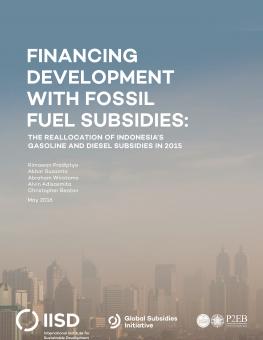
Financing Development With Fossil Fuel Subsidies: The reallocation of Indonesia's gasoline and diesel subsidies in 2015
This report investigates how fuel subsidy reform and reallocation in Indonesia have been a major step forward in improving public expenditure.
At the very end of December 2014, Indonesia introduced major reforms to its fossil fuel subsidies, removing subsidies to gasoline (except for distribution costs outside of the central islands of Java, Bali and Madura) and introducing a “fixed” subsidy of IDR 1,000 per litre for diesel.
At the same time, world oil prices plummeted. Together, these changes led to massive fiscal savings, equal to IDR 211 trillion (USD 15.6 billion)—over 10 per cent of state expenditure.
This study investigates two central questions: Where were these savings reallocated? and Is the new expenditure doing a better job for Indonesia’s development than subsidies? It concludes that fuel subsidy reform and reallocation in Indonesia have been a major step forward in improving public expenditure.
Participating experts
You might also be interested in
How Indonesia's Incoming President Can Advance the Transition to Clean Energy
With Prabowo Subianto inaugurated as Indonesia’s President, speculation abounds about the new administration’s commitment to the clean energy transition and climate targets, given Prabowo’s positioning as the “continuity candidate.” The question is, what, exactly, will be continued?
What the war in Ukraine means for Asia's climate goals
The queues outside petrol pumps in Sri Lanka have lessened, but not the anxiety. Asanka Sampath, a 43-year-old factory clerk, is forever vigilant. He checks his phone for messages, walks past the pump, and browses social media to see if fuel has arrived. Delays could mean being left stranded for days. "I am really fed up with this," he said. His frustrations echo that of the 22-million inhabitants of the island nation, facing its worst ever economic crisis because of heavy debts, lost tourism revenue during the pandemic, and surging costs. The consequent political turmoil culminated with the formation of a new government, but recovery has been complicated by Russia's invasion of Ukraine, and the consequent upending of global energy markets.
Curbing fuel subsidies is only the first step out of energy crisis
Indonesia’s fuel subsidies have been a recurring problem for the country’s economy. For years, they have been weighing on the state budget, providing unjust support for fossil fuels and slowing the much-awaited clean energy transition. But skyrocketing global energy prices could require the country to allocate a colossal Rp 700 trillion (US$46.6 billion) for energy subsidies this year – more than four times the budgeted amount.
Switching Fossil Fuel Subsidies in Indonesia to Support a Green Recovery
This brief looks at how Indonesia can start actively promoting renewable energy by removing the existing hurdles to its deployment—such as unattractive renewable energy feed-in tariffs and land and infrastructures barriers—and switching public support from fossil fuels to renewables to meet the country’s clean energy targets.